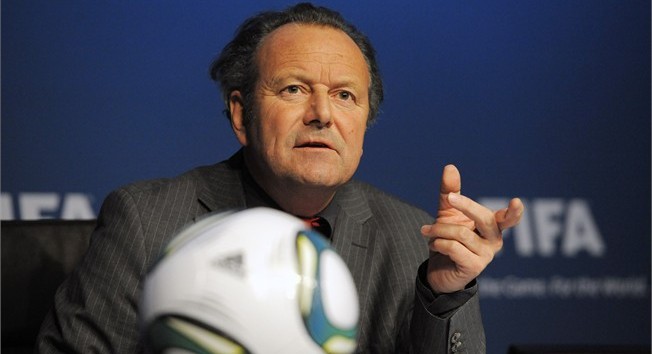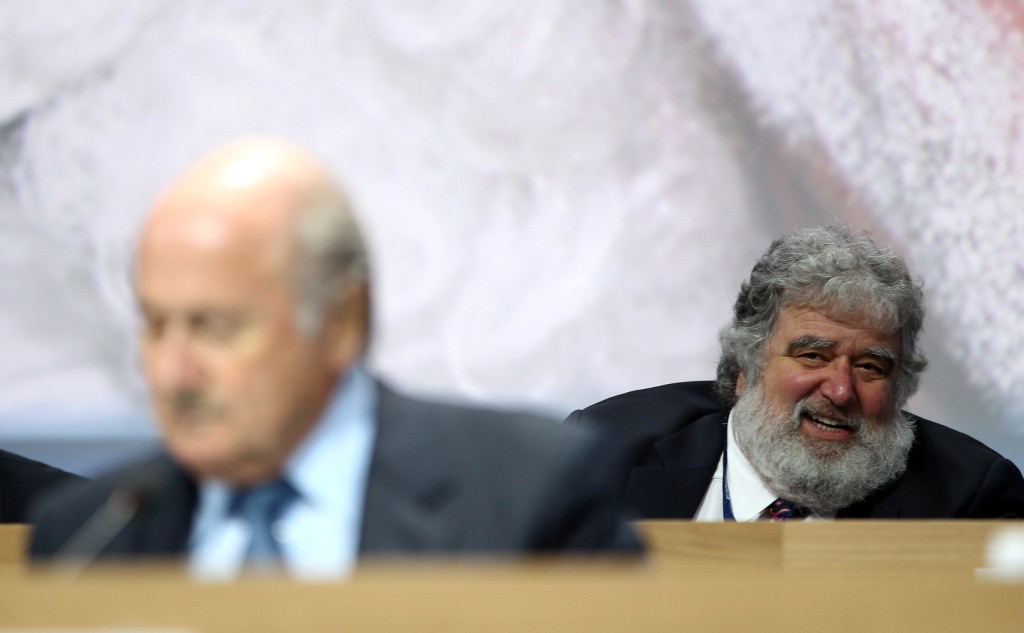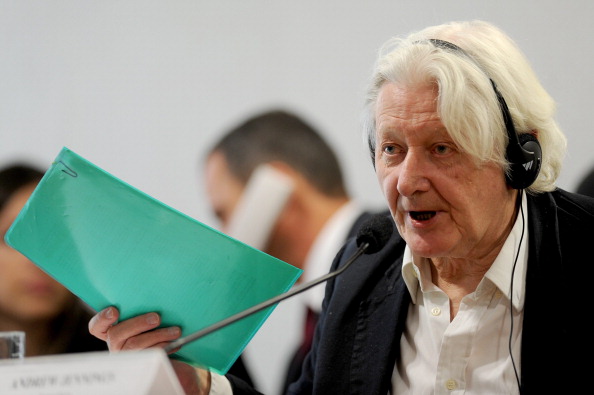By Andrew Warshaw
January 9 – Three investigative journalists who have been probing FIFA conduct over a number of years have spelled out why they have snubbed an offer to take part in Sepp Blatter’s reform programme.
Jens Weinreich, Andrew Jennings (pictured) and Jean François Tanda say the invitation to participate is simply based on self-protection by the FIFA President rather than a genuine effort to put world football’s governing body back on an even keel after a year of unprecedented scandal.
The three writers were invited to meet with Swiss anti-corruption professor Mark Pieth, who chairs the new Independent Governance Committee.
Instead, Weinreich, Jennings and Tanda outlined a series of steps they say FIFA and Blatter should take to prove they are serious about fighting corruption.
The snub has come at an embarrassing time for the credibility of FIFA’s reform programme which has already been rocked by the withdrawals of Transparency International and Football Supporters Europe.
On Monday, FIFA holds its glittering Ballon d’Or gala in Zurich but behind the scenes a far greater priority is restoring its battered reputation.
In a statement rejecting an offer to assist in the process, the journalists wrote: “It is absurd that Blatter…is controlling this ‘clean-up’ scheme.
“It is created by Blatter to protect him and those close to him.
“His pretence of a ‘road map to reform’ is risible.”
The trio then issued the following hard-hitting bullet-point synopsis of how FIFA should be acting instead to get to the heart of alleged misconduct throughout the organisation:
“1. Without delay Blatter can and must publish his personal copy of the report by Zug investigating magistrate Thomas Hildbrand into kickback corruption at FIFA and the recipients of more than 140 million Swiss Francs ($146 million/£95 million/€115 million) in bribes paid by former marketing company ISL/ISMM. We are advised that there is no legal impediment to Blatter putting his copy online today. We do not believe his claims that unnamed people are delaying publication by him. We are told that the report destroys his claim in June 2010 to have been ‘cleared’ by the investigation.
2. Blatter should publically instruct his friend Jean-Marie Weber…to disclose the identities of all sports officials who received [kickbacks].
3. FIFA should adopt immediately genuine transparency. This means putting all FIFA information online – as do all first world governments – including audio/visual streaming and written minutes of all committees, accompanied by all reports submitted. All votes on all occasions must be recorded by name.
4. FIFA’s published accounts are a disgrace, designed to disguise how football’s money is spent – and on whom. KPMG should be replaced by an auditor committed to transparency.
5. Publication of all confidential management letters from auditors KPMG since 1999. These contain explosive evidence about misuse of FIFA funds…
6. All FIFA financial documentation since 1998 when Sepp Blatter became FIFA President should be put online – and then subjected to independent forensic examination.
7. This material should include all payment orders made by Blatter using his astonishing power to be sole signatory of cheques. Let the world see a list of who got the money.
8. FIFA’s finance department must produce the documentation of the $1 million (£650,000/€790,000) kickback of March 3, 1997 from ISL…that was mistakenly sent to FIFA’s UBS account and then re-routed by general secretary Blatter to [President João] Havelange.
9. Immediate suspension of FIFA Executive Committee member Nicolás Leoz, identified in court in Zug in March 2008 as the recipient of $130,000 (£84,300/€102,400) in bribes from ISL (later we discovered he got an additional $600,000 (£390,000/€470,000)!). FIFA can achieve the above, swiftly, without any outside intervention. That would show a genuine commitment to reform. Then the investigations can commence.

10. We think that the only credible approach is for Professor Pieth (pictured) to be empowered to hire a reputable, independent investigative company to conduct due diligence into all areas of alleged FIFA corruption.
We suggest the following crucial areas of investigation followed by rapid publication:
11. The salaries, bonuses and other benefits paid in the last decade to Blatter, Jérôme Valcke and all departmental directors.
12. All fees, bonuses and expenses – submitted and paid – of exco members in the last decade. And details of their Swiss tax arrangements.
13. The contracts and cost since 1998 of Blatter’s use of expensive chartered jets, his destinations and justifications for trips.
14. The allegations of corruption in the awarding of the 2018 World Cups to Russia and to Qatar in 2022 and the actions, where appropriate, of exco members Issa Hayatou, Jacques Anouma, Hany Abo Rida and Amos Adamu. This crucial investigation should be handled professionally by law enforcement agencies or an independent investigation company, and where possible, liaising and assisting the current FBI investigations.
15. Investigating all aspects of the FIFA-related activities of Worawi Makudi of Thailand including the disclosure of money from FIFA’s Goal and FAP-programme and also World Cup TV rights for Thailand.
16. Investigation of allegations made in Argentina that FIFA finance committee chair Julio Grondona controls offshore accounts, mostly in Switzerland, containing $120 million (£78 million/€94 million). There seems no obvious source of this wealth.

17. Investigation is long overdue into how Chuck Blazer (pictured) could simultaneously be both treasurer and general secretary of CONCACAF – and the secret payment to him of $10 million (£6.5 million/€7.9 million) in recent years as ‘commissions’. Have his offshore assets come from FIFA funds – including his vintage Mercedes car registered in Zurich in FIFA’s name?
18. Re-open the investigation into Jack Warner and extend it to embrace every payment of any kind since 1998 to Warner, members of his family, companies owned by him including Simpaul travel agency, the CFU, CONCACAF and the João Havelange Centre of Excellence.
19. Investigate Blatter’s election campaign expenses for every election including 1998…
20. Who paid Walter de Gregorio and Brian Alexander to organise Blatter’s campaign in 2011 to retain the presidency? Mr Alexander does not appear to be employed by FIFA but he briefs reporters at FIFA House on behalf of Blatter. Who pays him now?”
It also emerged, meanwhile, that a fourth journalist was also invited, but declined, to cooperate with FIFA’s Independent Governance Committee.
In a statement, Thomas Kistner of the German newspaper Süddeutsche Zeitung cited many of the same points made by his three colleagues and said he could “see no responsibility to take an active part in a process originally initiated and paid for by FIFA.”
Contact the writer of this story at zib.l1745177347labto1745177347ofdlr1745177347owedi1745177347sni@w1745177347ahsra1745177347w.wer1745177347dna1745177347
Related stories
December 2011: Former British Attorney General appointed to FIFA Governance Committee
December 2011: Blatter’s FIFA reforms face early setback
November 2011: Pieth calls for shorter terms and tougher screening of FIFA’s inner sanctum
November 2011: Anti-corruption guru Mark Pieth to lead FIFA reforms
October 2011: Blatter plans for reform welcomed by Transparency International

